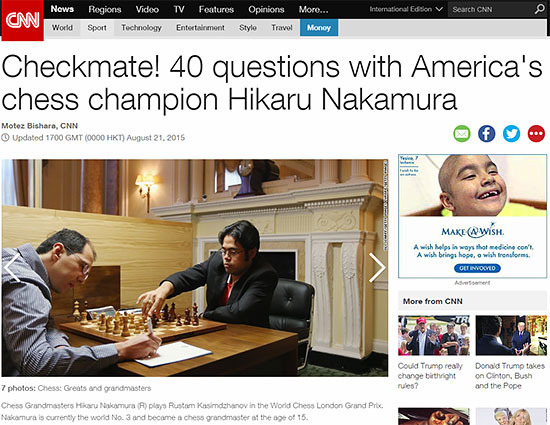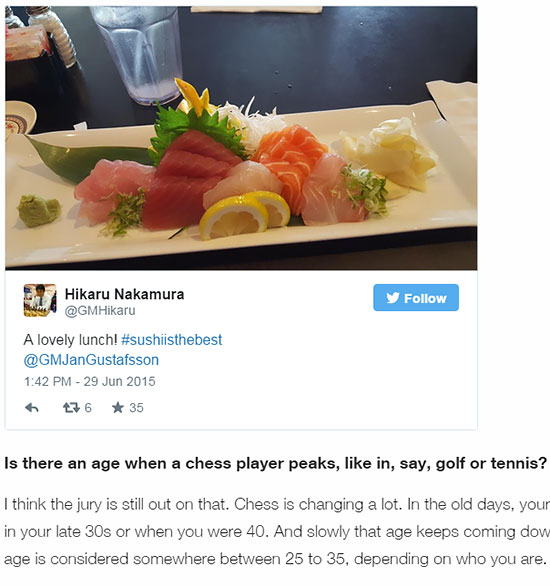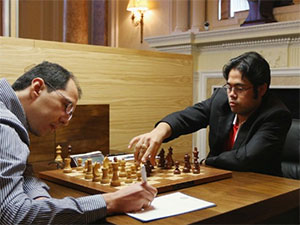Here are a few excerpts from the interview:
The early years
How old were you when you won your first tournament?
I was seven years old.
Did you play high school chess?
No I didn't play high school chess, because by that time I was already being home schooled. So I was competing in individual tournaments all over the world.
At what age were you pulled from the traditional classroom?
At nine years old, after fourth grade. Primarily it was to give me the opportunity to compete abroad because if I stayed in regular school I would not have been able to get the excused absences to compete in enough events to progress my career.
For example one tournament is roughly nine rounds, and most of them were serious enough that it was one round per day, so if you average that out, that's nine days potentially. You can do that once or twice during the school year, but beyond that it's just not going to work.

CNN posted an unusually long interview to see what made Nakamura tick
Any idea you'd go on to be a chess champion at that point?
I think they had some inclination that I might become a top chess player -- I was already one of the top junior players in America -- but to go from a strong junior player to world champion caliber, you really can't know that ahead of time.
They perhaps had some dreams or thoughts, but I don't think they really thought it was likely. I think they just wanted to see how far it could go.
At what age did the corner start to turn?
I think when I was 15-years-old, when I broke the record for the youngest American grandmaster. Bobby Fischer previously held the record (Nakamura was three months younger; it has been broken twice since.) Once I broke the record, I knew I would have some chances to go quite far.
The ideal age
Is there an age when a chess player peaks, like in, say, golf or tennis?
I think the jury is still out on that. Chess is changing a lot. In the old days, your peak was considered in your late 30s or when you were 40. And slowly that age keeps coming down. Right now, the peak age is considered somewhere between 25 to 35, depending on who you are.
I think I'm still on the way up.
Was (former world champion) Anatoly Karpov past his peak when you beat him in 2009?
Yeah absolutely. He's an example of the older generation. He was peaking in his late 30s, around 1990.
One thing that I really respect about Karpov is that even now he still plays a few tournaments of competitive chess every year. He doesn't care that he isn't the best anymore, whereas some of the other former champions -- like Kasparov for example -- would never be able to compete anymore because he had to be the best, and if he wasn't the best his ego couldn't handle it.

The questions included topics such as food or what he saw himself doing had he not been a chess player
The offbeat
There were a number of unusual questions obviously meant to see the flip side of the coin, the Plain Joe part of the player. An example:
Being a chess champion must be a useful thing to write on a Tinder profile. Have you found that?
I'm actually engaged so I've never used Tinder (laughs).
I think the most important thing -- whether it's women, or just making a general impression on people -- is to show there is a lot more to chess than meets the eye.
It's a very interesting game; you get to travel a lot and meet many different people from many different backgrounds. Most people think of chess as this nerdy game where you just stay in your room all day and play...but most of the top chess players, we do have a life and there are other things going on.
Click here to read the full interview

























